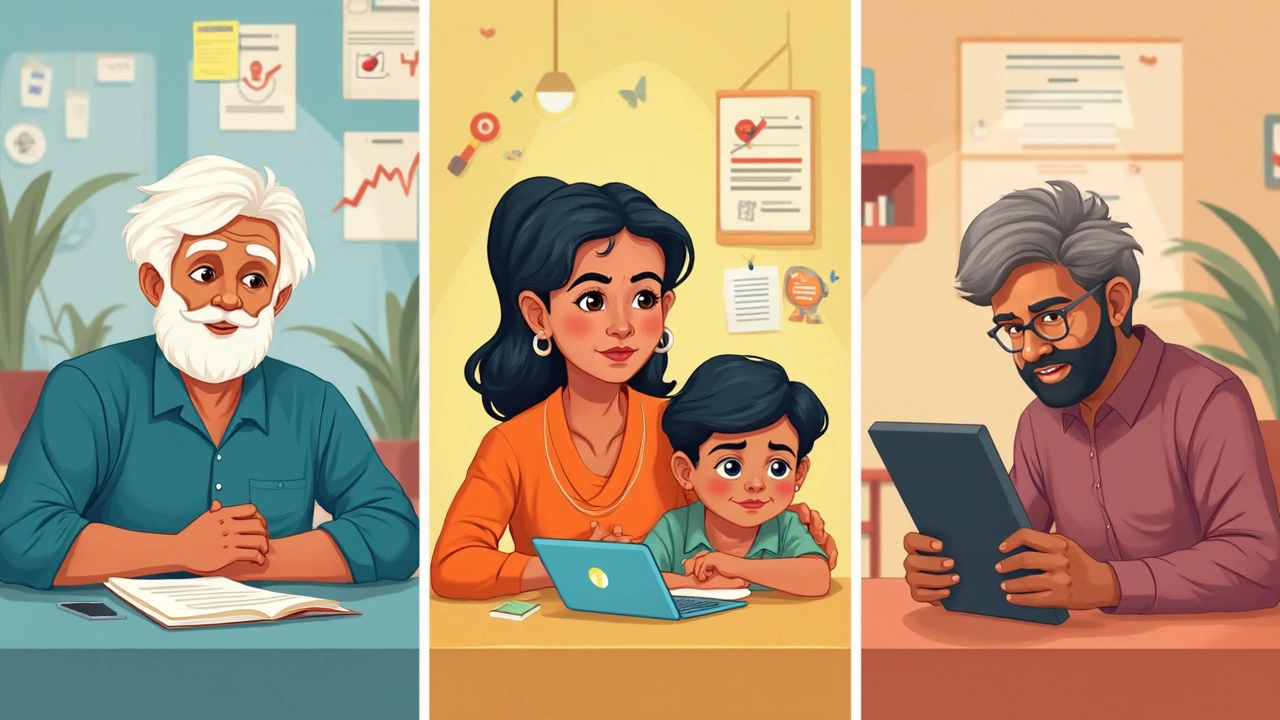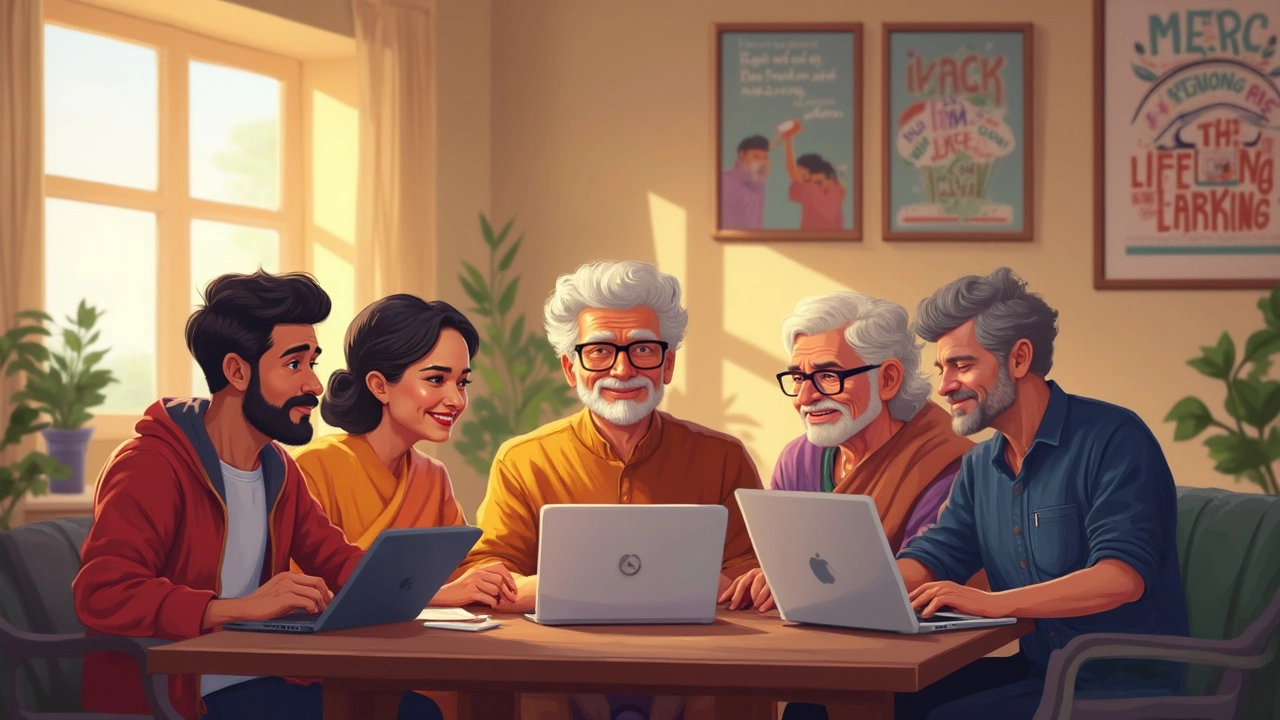So, you're hitting the big 5-0 and thinking about picking up coding? Plenty of folks wonder if they're just too old to jump into tech. Maybe you’ve heard it’s a young person’s game or that your brain just isn’t as quick anymore. Here’s the thing: there’s no real age limit on learning to code. It’s not like trying out for a pro football team—your knees stay safe at the keyboard.
People over 50 are joining coding bootcamps, finishing online classes, and landing software jobs more than ever. In fact, plenty of them find that their work experience, patience, and problem-solving chops help them get ahead. You probably already know more about time management and sticking with hard projects than most 20-year-olds do.
What actually matters is that you start with the right mindset and the right tools. It’s easy to get intimidated, especially if you haven’t been in a classroom in years. But coding is really just breaking big problems into tiny steps—something you’ve done your whole life, even if you didn’t call it “debugging code.”
- Why Coding at 50 Isn’t Too Late
- Common Fears and Real Barriers
- Older Learners: Surprising Advantages
- Practical Tips to Make Coding Stick
- Best Resources and Communities for 50+ Beginners
Why Coding at 50 Isn’t Too Late
Let’s clear up one thing—there’s zero scientific proof that you lose the ability to learn new skills at 50. In fact, research from the University of California shows that the brain can form new connections up into your 70s. The tech industry has noticed this too, with coding bootcamps now reporting that almost 12% of their students are over 40, and the 50+ crowd is growing every year.
If you’ve built a career already, you’re no stranger to learning complex stuff. Coding is just another tool—not some magic only unlocked by younger folks. Big-name companies have hired folks well past 50; IBM, for example, has launched retraining programs for experienced workers. And Code Academy says that people above 50 stick with courses 30% more often than their younger classmates.
Check out this quick snapshot of what’s happening right now:
| Statistic | Detail |
|---|---|
| Bootcamp students 50+ | Up 22% since 2020 |
| Course completion rate (age 50+) | 78% (vs 61% for under 30) |
| Companies with 50+ coding hires since 2022 | 78 U.S. tech employers |
And here’s the thing—hiring managers these days care more about what you can do than what year you were born. You might not be the youngest in the room, but your work ethic and lived experience count for a lot. The biggest challenge is getting over the idea that tech is off-limits once you pass a certain age.
Start small, keep going, don’t let the calendar boss you around. Anyone asking themselves, "is 50 too old to learn coding?" is honestly just asking the wrong question. The real question is, do you want to learn? Because you absolutely can.
Common Fears and Real Barriers
One of the biggest worries folks have about learning to code at 50 is feeling left behind by younger people who grew up with computers. That can make joining a beginner class or signing up for learn coding at 50 programs seem intimidating. But here’s the deal: it’s totally normal to worry about not knowing enough, falling behind, or making mistakes in public. You’re not alone—almost every older beginner feels awkward at first.
Let’s get real about some classic fears:
- “I’m too old to keep up.” There’s research that shows adults over 50 can learn new skills just fine. You might not pick up shortcuts or new syntax as fast as a teenager, but your brain can handle it if you stick with it.
- “I don’t have a tech background.” Most entry-level coding classes are designed for folks who barely know how to copy and paste. If you can write an email, you can learn basic coding.
- “I’ll look silly or out of place.” Surveys from several coding bootcamps, like General Assembly and Codeacademy, report that between 10-15% of their new learners are over 45. You won’t be the only beginner in your age group, not by a long shot.
And then there are real barriers to be honest about. The first is time. Maybe you have a job, family, or other commitments that make regular lessons tricky. A good workaround is scheduling short daily sessions—just 20-30 minutes a day can add up fast. The second is confidence. Many people get stuck thinking one mistake means you’re bad at coding, but debugging and fixing errors is half the learning process. Finally, some tech platforms and assignments assume you know a lot of jargon. It helps to find beginner resources and active forums where you can ask what everything means without feeling dumb.
If you’re worried about the money side of things, there are plenty of high-quality, free or low-cost online courses out there. No need to break the bank. The trick is finding material with a clear learning path, steady community support, and real-life examples—that makes it way less stressful, especially when stuff gets confusing.

Older Learners: Surprising Advantages
If you think the tech world only favors fresh college grads, think again. People over 50 show up with a toolkit that most younger coders don’t even have yet. You’ve handled deadlines, worked with all kinds of personalities, and probably faced way tougher challenges than any sticky line of JavaScript.
One key thing older beginners get right is patience. Coding often requires sticking with a problem for hours, even days, until you find the bug or get that function working. Studies from 2023 by Harvard’s lifelong learning initiative found adults over 50 outperformed their younger classmates in consistency and following through on complex projects.
- learn coding at 50 is easier if you’re used to figuring things out on your own (think: setting up your first smartphone or dealing with a grumpy printer at work).
- You don’t panic when you hit a wall—you’re less likely to give up early.
- Your focus on the "why" behind a problem helps you see a bigger picture, not just single lines of code.
Older students also bring something called “transferable skills.” Maybe you led a team, wrote reports, or managed a budget. Coding is just problem-solving with a computer. In fact, 61% of professional bootcamp instructors in a 2024 Stack Overflow survey said students over 50 bring strong attention to detail and reliable communication—that’s gold in software projects.
| Advantage | Why It Matters in Coding |
|---|---|
| Life experience | Helps you plan, troubleshoot, and keep projects realistic |
| Patience | Makes debugging less frustrating |
| Work ethic | Helps you stay motivated with self-study routines |
| Communication | Better at asking for help and working in a team |
It’s funny, but the things that most adults worry might hold them back—"I haven’t been in school for years" or "I’m not a digital native"—are often the very things that make you better at coding in the real world.
Practical Tips to Make Coding Stick
The biggest hurdle isn’t your age—it’s building habits that last. If you want to actually get good at coding, consistency beats cramming. You know yourself best, but here are specific tips that have helped loads of folks, especially beginners over 50:
- Set a dedicated study time every day, even if it’s just 30 minutes. Daily practice helps your brain connect the dots without getting rusty. Successful adult learners often pick early mornings or quiet evenings.
- Write out code by hand sometimes. It slows things down just enough to help you actually remember how things work. A 2019 study from the University of Washington backed this up: writing code (instead of just copy-pasting) improved retention by up to 25%.
- Use bite-sized learning platforms like FreeCodeCamp, Codecademy, or Khan Academy. These break concepts down and let you learn at your own pace—no embarrassment if you need to repeat a lesson.
- Test yourself right away. Don’t just watch or read—actually build a tiny project or solve a problem after each lesson. Real, hands-on practice is how things stick.
- Find an accountability buddy or group. Whether it’s a local meetup, an online forum, or just a friend who checks in, this makes a big difference.
Feeling stuck? It’s normal. Celebrate small wins, like fixing a bug or finishing a mini-project. Don’t compare your speed to a 20-year-old who’s grown up on tech—the race is only against your last session, not theirs.
Here’s what actually works based on success rates:
| Learning Method | Retention Rate (%) |
|---|---|
| Passive (Watching videos only) | 15 |
| Hands-on Coding Exercises | 60 |
| Project-Based Learning | 75 |
| Peer Learning/Discussion | 55 |
Want to really drive progress? Focus on learn coding at 50 in real-world ways, like fixing your own spreadsheets, building a family website, or automating a boring task at work. When the code actually solves something in your life, you’ll stick with it.

Best Resources and Communities for 50+ Beginners
If you’re just getting started, don’t try to reinvent the wheel—use the stuff that’s already helped others in the same boat. The good news? There are loads of resources built for adult learners or at least super-friendly for beginners, no matter your age.
Let’s start with classes. Some of the big names in online learning—like Coursera, Udemy, edX, and Codecademy—offer beginner coding courses specifically tagged for “no prior experience.” For example, Harvard’s CS50 on edX doesn’t care who you are or how old you are; it’s designed for total newbies and is free to start. On Udemy, search for beginner courses in Python, JavaScript, or web development and check the ratings. Many older learners mention in reviews how beginner-friendly these classes feel.
- learn coding at 50 (SEO: your main keyword): Check out AARP's partnership with OATS (Older Adults Technology Services). They run practical tech classes—including coding basics—specifically for people 50 and up, all taught at a slower pace that’s perfect for anyone who hasn’t seen a classroom in a while.
- Local libraries aren’t just about books anymore. Many run coding classes or host coding meetups for adults, and you get face-to-face learning without spending a dime.
- Meetup.com has a bunch of adult coding groups, including specific ones for “coding after 40,” “tech beginners 50+,” and more. Virtual and in-person options are both there, so you’re not limited by geography.
The real magic happens when you have a group to keep you motivated. Here are some standout communities:
- freeCodeCamp: Their forums and local study groups are packed with all kinds of learners, and there’s zero age snobbery. They love beginners, and the support is real.
- Reddit’s r/learnprogramming: Full of straight talk and advice. Seniors post questions all the time, and you’ll spot lots of encouragement from folks who started late.
- LinkedIn Learning: Besides courses, you’ll find groups for adult learners switching careers. It’s also a way to spot real people who made it work after 50.
Here’s a quick table of some popular options and what they offer:
| Resource | Type | Notable Features |
|---|---|---|
| OATS (Senior Planet) | Instructor-led, in-person/online | Classes for 50+, step-by-step help |
| freeCodeCamp | Online, self-paced | Community forums, hands-on projects |
| Coursera/edX | Online, self-paced | University courses, certificates |
| Meetup.com | Community-based | Practice groups by age/location |
| Local Libraries | In-person | Small classes, free resources |
One last thing: don’t get stuck trying to pick the “perfect” course. Try a few free resources, sign up for one supportive community, and let yourself experiment. The best learning happens when you ask questions, build projects (even tiny ones), and keep going with others cheering you on.
